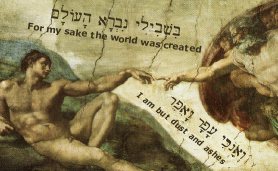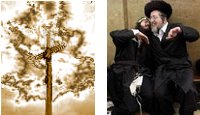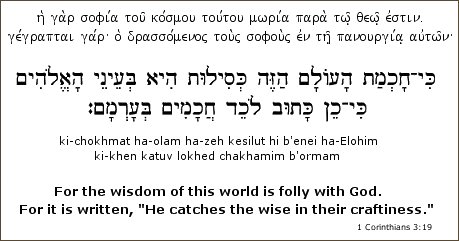|
March 2008 Updates
Pray for the Peace of Jerusalem
3.28.08 Just in time for Passover! Today I created a few new items for the Hebrew4Christians offsite store. Now you can show your support of Israel by wearing a "Pray for the peace of Jerusalem" button (in either Hebrew or English) at your upcoming seder! (These designs are also available on shirts, mugs, and magnets, too!)
 
The Glorious Dust that we are...
3.28.08 While writing the other day I remembered something I had once read regarding mankind's grandeur and lowliness. In a discussion regarding capital punishment, the Talmud states: "If a man strikes many coins from one mold, they all resemble one another, but the King of Kings, the Holy One, Blessed be He, made each man in the image of Adam, and yet not one of them resembles his fellow. Therefore every single person is obligated to say, bishvili nivra ha'olam, "The world was created for my sake" (Mishnah Sanhedrin 4:5). This is why murdering another human being created b'tzelem Elohim (in the image of God) is considered so horrendous. The sages reasoned that whoever destroys a single soul is accounted as if he had destroyed the whole world; and whoever saves one soul is accounted as if he had saved the entire world.
On the other hand, each of us must remember (as did father Abraham) that we are anokhi afar ve'efer - "but dust and ashes" (Gen. 18:27). While it is true that we are esteemed by God as His image bearers, our flesh (basar) comes from the dust of the ground. Even our beloved Lord Yeshua clothed Himself in such dust, demonstrating the ultimate form of humility and compassion for us (Phil. 2:7).
A chassidic tale says that every person should walk through life with two notes, one in each pocket. On one note should be the words, anokhi afar ve'efer -- "I am but dust and ashes." On the other note should be the words, bishvili nivra ha'olam -- "For my sake was this world created."
 |
Our true worth comes from being loved by the LORD God of Israel. May we all understand how precious we are in the true humility that marks our beloved Lord Yeshua. Wishing you a wonderful and joyous Shabbat, chaverim....
New Hebrew Meditation: Love's Vindication
3.27.08 Today I wrote a new Hebrew meditation (Love's Vindication) based the famous phrase of the prophet Job: "For I know that my Redeemer liveth, and that he shall stand at the latter day upon the earth" (Job 19:25).

Parashat Shemini - פרשת שמיני
3.24.08 I updated the Torah portion for this coming Shabbat (Shemini).

On the Shabbat after Purim the chapter of Parah Adumah, or the Red Heifer (Numbers 19), is read following the regular Torah service. The sacrifice of Yeshua the Mashiach is the fulfillment of the symbolism of the parah adumah. Both were entirely rare and without defect (sin); both were sacrificed outside the camp; both made the one who offered the sacrifice unclean but made the one who was sprinkled by it clean; and finally, both sacrifices cleanse people for priestly service.
Purim Sameach - Happy Purim!
3.21.08 I am still dealing with the complete system crash that occurred here over the last couple days -- cleaning up, restoring files and links, redeploying the forums, working with a new web hosting company, etc. Nonetheless, I rest in the sovereign Hand of God and understand that this site is His to do with as He pleases... (Often I wrestle with the amount of time/energy I expend on here and need to remind myself that this venture -- as all others -- is a means to a greater end, i.e., that of knowing God and loving Him in the truth. My goal is not to master information or to cognitively "know" and communicate certain facts, but to live the truth in daily life, in the heat of the moment (or in its ennui, depending on the case)... That is always the goal of real learning, isn't it?
At any rate -- I wish you all Purim Sameach, chaverim!
H A P P Y P U R I M ! ! !

Note: You can read the book of Esther here.
Good Friday
To those of you observing the Christian liturgical calendar, I likewise stand in awe of the marvelous sacrifice of Yeshua, our Pascal Lamb who takes away the sins of the world! I thank the LORD God of Israel for the awful cost of His sacrifice -- and the agony His Son experienced on the Cross at Moriah... Baruch HaShem!

Since Purim is a celebration of God's deliverance of His people, and Good Friday intends to remember the sacrificial death of Yeshua as the means of our ultimate deliverance from the power of Satan and sin, the two holidays are not unrelated in the spiritual truth they relate, chaverim.... In both cases God demonstrates His victorious love; and in both cases are the powers of evil vanquished and ultimately destroyed.

Nevertheless, since Passover begins a month later this year, there is an ambivalence about the conjunction of Purim -- traditionally a happy and celebratory time -- with the solemnity of remembering Yeshua's sacrifice on the Cross... This is somewhat similar to my sentiments regarding Yom Kippur -- is it a happy time or a sad one? (See my entry about "synchronicity," below.)

Web Hosting Headaches
3.18.08 The site is basically down and out, friends... I apologize, but this is entirely outside of my control. B"H I will be relocating the site to another web hosting service soon. You will experience some disruptions in service, though I will do my best to keep that to a minimum. Shalom.... and Happy Holidays to you all.

Parashat Tzav - and "Synchronicity" Issues
3.17.08 Despite the enervating fact that my current web hosting service has not resolved the connectivity issues here (even after countless hours on the phone troubleshooting with them), I managed to update this week's Torah portion (Tzav) for this coming Shabbat.

Notice that since this is a Jewish leap-year, Passover and "Easter" fall about a month apart (the two holidays are closer during non leap-years). So on the Jewish calendar this Thursday is the Fast of Esther (Ta'anit Ester) and this Friday is the festival of Purim, whereas on the Christian calendar this Thursday is called "Maundy Thursday" and this Friday is "Good Friday." (Sigh...) When Yeshua returns to establish His Kingdom on the earth, He will restore the purity of the sacred calendar once and for all...
In Messianic circles, there is often a lot of work done to restore Christianity to its Jewish roots. If done from a humble attitude that is grounded in grace, this is commendable and potentially helpful for those steeped in various Church traditions. For example, instead of celebrating liturgical events surrounding Holy Week (i.e., "Maundy Thursday," "Good Friday," etc.), Messianic Seders are performed, with careful reenactment of the last meal Yeshua shared with His talmidim (disciples). This is a beautiful experience that helps us further understand the New Covenant for us. (Note that most Messianics dismiss the idea that Yeshua was crucified on "Good Friday" since it would have been impossible for Him to have been "three days and three nights" in the earth (Matt. 12:38-40; 16:4) and yet rise from the dead before sunrise on Sunday morning -- for more, see this). To make our "synchronicity problem" even more pronounced, most Messianic believers follow the Jewish calendar in their reckoning of the seasons, so (again) during leap-years we have an added sense of cognitive dissonance among our Christian friends....
On the other hand, "Messianic Judaism" tends to be weak celebrating two crucial times of the Sacred Calendar, namely, the Birth of Mashiach and His Resurrection from the dead. Since these are the two most important facts of all space-time history, it should come as no surprise that various Church traditions have centered their liturgical calendars around these events...

What's needed today is for a distinctly Messianic celebration of the birth of Yeshua (perhaps during the festival of Sukkot) and a celebration of Yeshua's Resurrection (perhaps during Reshit Katzir). Of course some Messianic congregations do indeed observe these mo'edim and make the associations between the Torah and the New Testament, but sadly, many do not, and some even expend precious energy engaging in polemics or affecting elitist sentiments rather than offering genuine alternatives to the entrenched traditions of men....
For those of you who will be honoring the last Seder Yeshua had with His disciples this week (i.e., Holy Week), I wish you a blessed and joy-filled time of honoring the LORD God of Israel... And for those of you who will be celebrating Esther/Purim, I likewise wish you a joy-filled time of remembering God's victory and deliverance for His people. In all these things, my prayer is that the LORD will give us all wisdom and grace to be attuned to His word and His truth, chaverim. Shalom...
Web Server Issues
3.12.08 I spent a few hours on the phone with my web hosting service today trying to chase down what might be causing the site slowdowns and outages. Unfortunately, we were unable to resolve the issues, so you might experience timeout problems when browsing the site here. I apologize and solicit your prayers.
Passion and Paradox
3.12.08 I added another Soren Kierkegaard article today that looks at the relationship between faith and reason, or as Kierkegaard puts it, between "passion and paradox." If read attentively, this article will stretch you, but it provides a worthwhile reminder that traditional Christian "apologetics," at least as it has been developed in the West, is inherently "Greek-minded" and (paradoxically enough) faith-evading.

Parashat Vayikra and Humilty
3.11.08 I updated the weekly Torah reading for this coming Shabbat (Vayikra):

There is a textual oddity in the very first verse of the Book of Leviticus (and the first verse of this week's Torah portion):

The sages reasoned that Moses' humility (anavah) was such that he waited for the LORD to call him into the ohel mo'ed (Tent of Meeting), despite the fact that God had previously granted him full access to His Presence. The Book of Leviticus begins with vayikra ("and he called") -- spelled with an undersized Aleph -- as a scribal token of Moses' humility.
According to midrash, Moses wanted the word vayikra to be written without the Aleph, as vayikar ("and He happened upon," the same word used to describe how the LORD "happened upon" Balaam in Numbers 23:4). In his humility, Moses did not want to use a word that implied that the LORD regularly called to him. The LORD overruled his choice of orthography, however, and insisted that the Aleph be included. Nevertheless He conceded to Moses' request by allowing him to write a diminutive version....
The Book of Leviticus (Sefer Vayikra) is known as the "Book of Sacrifices." Notice that all of the sacrificial animals that were deemed kosher were non-predatory, and therefore "humble." Atonement rituals (i.e., blood sacrifices) were accompanied by viduy - "confession" - and therefore implied a humble heart attitude as well. When confession is made before the LORD, you thereby acknowledge your need for His forgiveness and love.... God resists the proud but gives His grace to the lowly of heart (James 4:6; 1 Pet. 5:5).
 |
Shabbat Zachor
The Sabbath before the festival of Purim is called Shabbat Zachor ("Sabbath of Remembrance"). Because it is thought that nefarious Haman, villain of the Esther story, descended from the Amalkites, an additional (musaf) Torah portion is recited that recalls the enmity of the Amalkites (Deut. 25:17-19).
Loch in Kop - A hole in the head
3.10.08 Recently I've been experiencing some technical problems updating the site here, including some very slow page load times.... I've contacted my service provider and they are attempting to find a solution. Please offer up a prayer for the ISP that is hosting Hebrew4Christians. Thank you, chaverim...
On another note, I read an article today that explained that the current cost of war operations in Iraq now reaches $12 billion a month.
If my math is correct, then $12 billion divided by 30 (days) comes out to $400,000,000 (four hundred million dollars) a day. If there are 150 million in the USA that are employed (US Department of Labor - Bureau of Labor Statistics), each person is "paying" nearly $1,000 per year to sustain this venture in Iraq (let alone the incalculable costs associated with the pain and suffering of US troops and Iraqi civilians). We need to be in prayer and repentance, asking the LORD for mercy upon this country, chaverim.

Book Project Troubles...
3.06.08 Shalom chaverim. The manuscript for the new book I wrote has been completed for awhile, but sadly there have been some setbacks regarding the publishing process that have yet to be resolved. Your prayers for this work are appreciated. Thank you.

I am also dealing with physical pain again and sleep troubles. Trusting with you for God's perfect will to be accomplished in our lives.... - John
Kesilut - Wisdom and Folly
3.05.08 The "wisdom of this world" (σοφια του κοσμου τουτου) is the prevailing cultural spirit that suppresses the reality of God's Presence and truth. It is the realm of the savvy, the worldly-wise, the shrewd, the intellectual, the prudent, and even the "doctrinally pure," as we will see. Yeshua once remarked that "the sons of this world are more shrewd (φρονιμως) in dealing with their own generation than the sons of light" (Luke 16:8).

In 1 Corinthians 3, the Apostle Paul admonished Christians to get beyond their "party loyalties" and doctrinal strife in order to understand that Mashiach is the Foundation, the Archimedean Point, of all true wisdom about life. Authentic wisdom is humble in its apprehension of the mysteries of God (μυστηριων θεου). It does not boast in men's ideas or lean upon the calculations of carnal human reason. Indeed, the way of the Spirit is often at odds with the intuitions of reason itself, since it is based not on an ideology or doctrinal "system" but upon the Living Presence of the Teacher. Therefore Paul said, "Let no one deceive himself. If anyone among you thinks that he is wise in this age, let him become a fool that he may become wise" (1 Cor. 3:18).
Of course Paul didn't mean that Christians were to board some "Ship of Fools" and live as spiritual absurdists in this life. He knew that there were many Scriptures that commanded the pursuit of wisdom, truth, understanding, and so on. Paul was teaching in a rabbinical style and used hyperbole to make his point. In light of the truth of the Presence of God Himself, adherence to creedal formulas or allegiance to a particular human teacher makes "wisdom" ultimately foolish and futile. The need to be "right" is often based on ignorant motivations that cloak an inward condition of pride, vanity, and unbelief.
 |
In the verse above (1 Cor. 3:19), the Hebrew word translated "folly" is kesilut, perhaps better understood as stupidity (the Greek word used is μωρια). The "wisdom of this world" is ultimately based on fear that leads to the desire to control others. Sometimes, as in the case of warfare, it leads to acts of violence and murder. Human reason designs and schemes in order to obtain its self-serving ends, whereas heavenly wisdom understands that there is no further "end" in sight than that of the LORD Himself and His Presence....
Every sect or group tends to define and enforce its own sense of "wisdom" (ideology, creed, liturgy, worldview, etc.), though the LORD calls us to resist this spirit in order to function as a true witness of His Presence (1 John 2:15-17). Living this way will invariably result in a "collision" with our surrounding culture as we testify that God is here now.

It's axiomatic, then, that the ideology and coercion of the crowd, the various forms of "worldly wisdom" (including religious wisdom) that seduces us to forget God's Presence, invariably leads to stupidity, blindness, and foolishness. Since the group is unable to apprehend this fact, a "debased" mindset ("group-think") evolves that leads to depravity and the lust to control and enslave others: "Since they did not see fit to acknowledge God, God gave them up to a debased (αδοκιμος) mind..." (Rom. 1:28).
Our battle today, as it always has been, is to combat the world and its "wisdom" (i.e., propaganda, lies, and disinformation) by witnessing to God's Presence. This is essentially a spiritual war, since the battlefield is the thickened hearts and dulled minds of those who are in varying states of blindness to the Truth (2 Cor. 4:4; 10:4-5). Of course we must begin with ourselves and examine our own inward condition (2 Cor. 13:5). Are we truly walking in faith? Do we experience every moment of our lives as a gift from God? Do we directly encounter the Teacher within our hearts, or - God forbid - are we merely impostors, pretenders, or professors?
If we ask the LORD for wisdom, He has promised to give it to us (James 1:5). After obtaining wisdom and discernment, we must engage our culture and speak the truth in love. Tzedek tzedek tirdof: "Justice, justice shall you pursue" (Deut. 16:20). To be passive or to resign oneself is to abandon our post. Ask the LORD for the courage to live and speak your convictions. He is faithful and will preserve all those who call upon Him in the truth.
Parashat Pekudei
3.02.08 I updated the Torah portion for this coming Shabbat (Pekudei) and created a PDF file for you to download.

In this parashah the Shekhinah Glory of God appears at the newly dedicated Mishkan (Tabernacle), indicating the LORD's Presence among His chosen people. This Presence was tragically forfeited, however, on account of Israel's repeated failures (which culminated in the destruction of the First Temple in 586 BC and the Second Temple in AD 70, both of which occurred on the Ninth of Av). According to some of the Jewish sages, however, when the Mashiach comes to Israel, the Presence of the LORD would abide permanently with the people, since unlike beholding the veiled glory of the LORD behind the curtains of the Mishkan, the prophet Isaiah foretold: "eye to eye shall they see the return of the LORD to Zion" (Isa. 52:8):
 |
For those who are His, Yeshua the Mashiach's Presence indeed abides within them forever (Matt. 28:20; John 14:16), though there is an "already-not-yet" aspect to this. In the Spirit we presently abide in Him and are forever part of Him, but we also expect Him to physically return to Zion (Zech 14:4) where "every eye will see him, even those who pierced him, and all tribes of the earth will wail on account of him." Even so. Amen" (Rev. 1:7). Yes, though we can know Him now in the power of the Holy Spirit, Yeshua is returning (soon) to fulfill the words of the prophets regarding the establishment of the kingdom of God upon the earth. God is faithful to His covenantal promises to Israel and will fulfill them in His good time. Those who belong to Him will partake in His glory when He sits upon the throne of David as the true King of Israel. Maran ata, Yeshua!
|
























